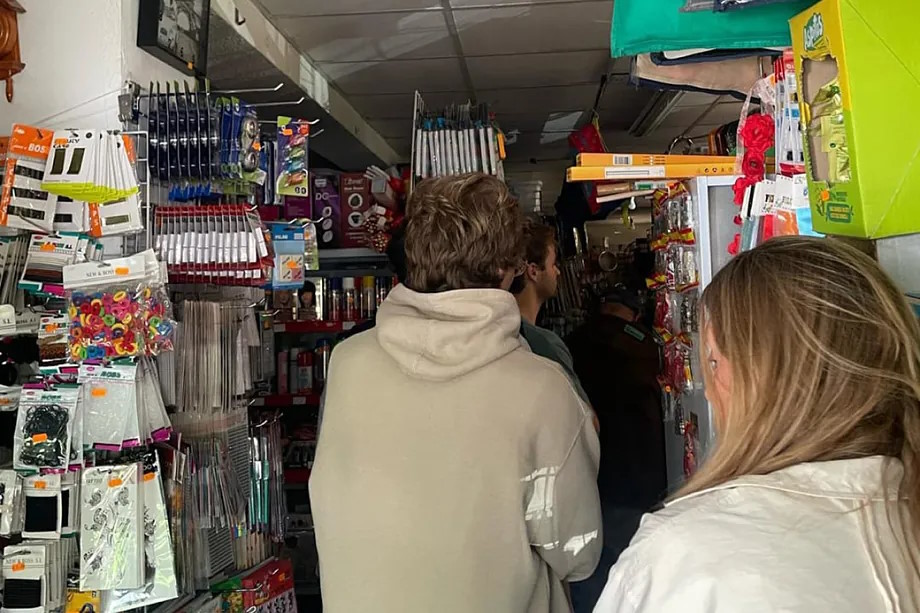"Watch out for the traffic lights." At the Stella Maris Fesd School in Arturo Soria, Madrid, the doors were not closed after the 12:30 pm dismissal of the children who did not stay for lunch. They remained open, guarded by the caretaker, Abel, who was accompanied by the principal, María Luisa, who gave a warning that many parents did not understand. The blackout caught them with the car already parked, and the surprise came later: when they tried to drive on a street where traffic lights dictate the law (and sometimes, not even them).
The route changes when there is no light. Wandering around is always an option if you have patience. Crossing at pedestrian crossings is simple. At intersections, not so much. And the right of way is gained by the accumulation of vehicles, coming from the left or the right, because drivers seem to feel that they always go straight.
If in the early morning the focus was on the garbage bins, to differentiate between neighborhoods where the trucks had already passed and those still in line, now it shifted to observing people's behavior. The hot spots were the bazaars, where customers left with water jugs on their shoulders and battery packs in their hands that they showed off as trophies to boast about.
The Government convenes the National Security Council
What can a major blackout in Spain cause? Saturated network, cyberattacks, and other invisible risks
In just over half an hour, a bazaar on the Madrid street of Víctor de la Serna ran out of the few transistors it had in stock. And in the next two hours, flashlights were sold out. At this time, they were still selling batteries and water bottles, but only small ones, half a liter. "The large ones are all gone," said the store manager.
People lined up hoping to find essential items for the blackout. "That kit they told us we should have and we took as a joke," said one of the customers waiting in the long line. In the end, instead of flashlights, he took a couple of packs of candles and several lighters.
The topic of the kit is recurrent among those waiting. "At least things are moving quickly," says another.
On the same street, two more bazaars were closed, an Eroski and an Alcampo. Most businesses remain closed. "What else are we going to do? Everything here is automatic," a worker retorted at the exit of Eroski.
A bazaar, in the dark after the major blackout this Monday.EFE
People in line listen to the radio from a double-parked car. "It's the only thing we can do," says the driver, who stopped to check if the bazaar had transistors.
In balconies on streets like Florencio Llorente, transistors were once again given a new life in the ears of the elderly, with the antenna up and memories of when league matches were played simultaneously, and the whistles of the sports broadcasts put listeners on alert: there was a goal at Las Gaunas.
The sudden popularity of traditional radio waves has become a constant throughout the city: many people walk around with transistors in their ears or pockets, and those who cross paths with them listen in or approach the car windows that have them on.
In jewelry stores, staff stood at the doors, with faces ranging from timid joy to concern, and residents of office buildings like those that accumulate in Torrelaguna or La Castellana experienced a spectacle reminiscent of apocalyptic series and movies.
"There is a tide of pedestrians with black backpacks," Begoña recounts, visiting an evacuated communication company on Olavide after trying to navigate a bit on Martínez Campos. Her goal was to reach the M-30. On the plus side, not having to deal with lifeless traffic lights. On the downside, it seemed like everyone had the same idea. The usual morning and afternoon traffic jam moved to lunchtime.
Pedestrians who still had coverage (which seemed to vary by neighborhoods and companies) were another focal point of attraction. Sidewalk neighbors asked them if they had any new information. The same happened to those who remained inside their vehicles with the radio on. In WhatsApp and Telegram groups, memes mixed with conspiracy theories. There were also couples where one of them showed off the external battery with a 2x1.5-meter solar panel that can be unfolded on the window and whose purchase was criticized at the time, just like the water purification tablets.
People from the islands also showed off their knowledge (and coverage). Especially the people from Tenerife, who on September 29, 2019, experienced a power outage that affected the entire island. "Twelve hours of blackout are unforgettable," Mar recalled to her son in Madrid, although the outage in Tenerife didn't last that long. The incident occurred at 1:11 pm on Sunday, September 29, 2019, at the Granadilla de Abona substation in the south, and by 9:00 pm, 70% of the power supply had been restored. In between, there were major connectivity issues in telephony, with saturated lines and the island practically cut off. Homes with butane gas stoves then smiled and endured the wait by cooking. This movement was also noticed at gas stations like Moeve (formerly Cepsa) on Agastia Street, where some drivers came ready to carry a gas cylinder on their shoulder... as long as they had the 21 euros in cash. Debit and credit cards became as useful as traffic lights.
